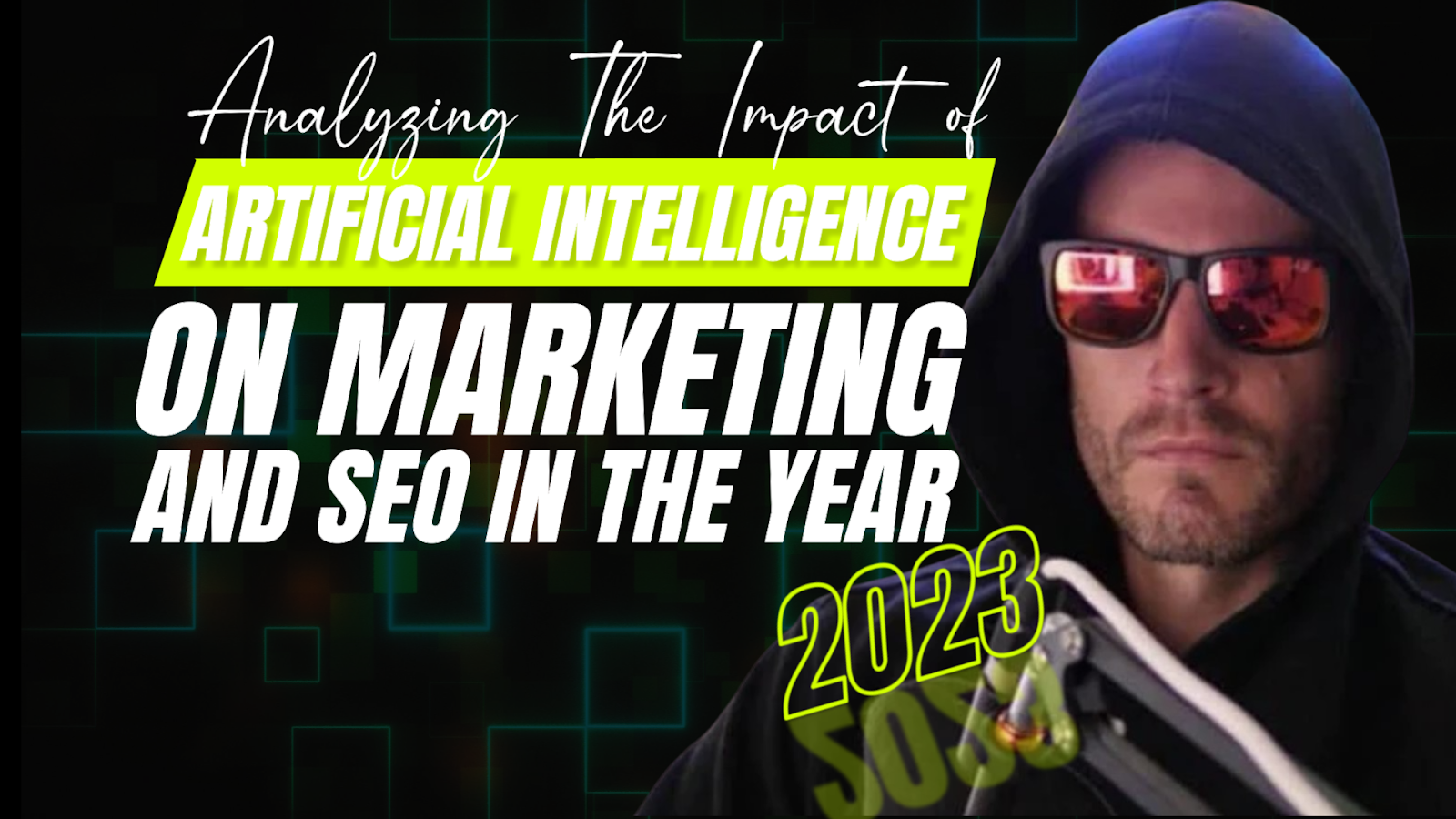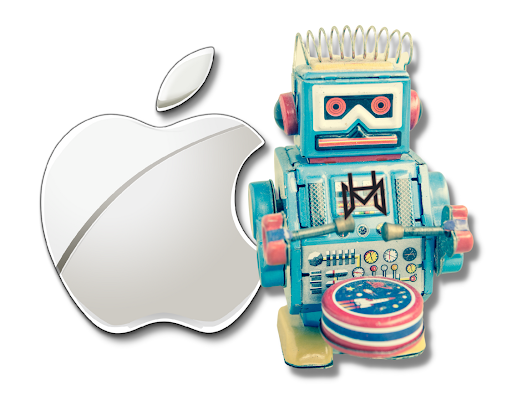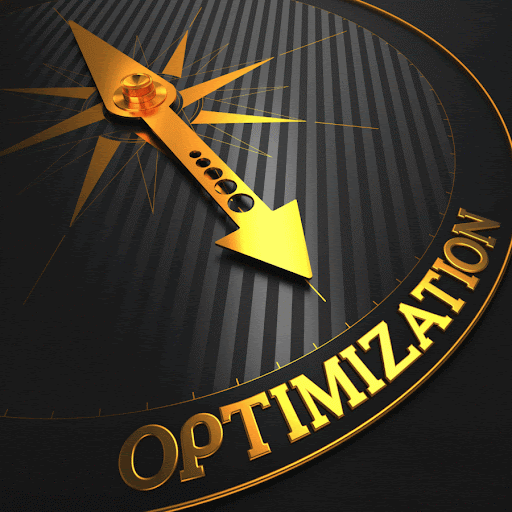
Analyzing The Impact Of Artificial Intelligence On Marketing And SEO In The Year 2023
Hello, Hyrolian! How goes it? We’ve got something to talk about today. It’s something that we’ve watched in creepy movies for years and it seemed far-fetched. But here we are, seeing Artificial Intelligence show up around a new corner every day.
Have you used it yet? I bet you’ve used it and you didn’t even realize it. It’s growing and gaining popularity. So, today, I’m gonna talk about the impact that this new-fangled AI tech can have on marketing and SEO this year.
Let’s get into it.

Generative AI technology has revolutionized the way we engage with search engine technology, and it’s fueling a new wave of search engine optimization for B2B marketers. ChatGPT, backed by OpenAI, Microsoft, and others is playing an increasingly significant role in how businesses are tailoring content to their respective customer base.
Using natural language processing features to provide personalized responses to questions posed using voice or text input, generative AI chatbot technologies are enabling marketers to bring an even more intricate understanding of customer intent into the optimization equation than ever before.
Google recently rolled out Bard as its own conversational AI-powered search engine, while Microsoft has also announced plans for Prometheus-based iterations of Bing in which an advanced machine learning system is able to analyze user-generated queries and tailor corresponding responses accordingly. By leveraging these AI toolsets, companies can easily identify the right topics and optimize their content accordingly without having to guess what prospects are looking for each time they enter a query, meaning that their efforts can reap rewards sooner rather than later.
As marketers continue to hone their knowledge of the power of AI-driven SEO, they’re also beginning to recognize the importance of incorporating artificial intelligence into other parts of their marketing campaigns. For instance, AI-powered sentiment analysis tools are being used to quickly and accurately measure how customers feel about a product or service. This data can be extremely valuable for marketers as it helps them focus their efforts on areas where customers are more likely to show engagement.
AI-driven optimization is also being used to create and curate content for marketing campaigns. For example, AI-driven algorithms can be used to identify relevant topics that are trending, helping marketers create content that’s more likely to resonate with potential customers. By leveraging AI tools in this way, marketers can create highly targeted campaigns
Revolutionary Advancement in Search Capability
Google’s recent launch of its new Bard AI service signals a revolutionary advancement in search capability that utilizes artificial intelligence measures to better refine web searches. With Bard, Google wants to reduce the challenges related to complex information by using AI to distill multiple perspectives and formats into something easier for the user to navigate.
Bard is tailored with an understanding of different search audiences in mind. This helps give priority to certain types of content over others based on who is accessing it. By using accumulated web data combined with its abundance of developing language models, Google hopes that its AI chatbot technology will be able to unlock powerful insights about products and services for users across all industries that can be used for research or personal consultation needs.
The integration of AI into the world of marketing and search engine optimization is set to be a game-changer for businesses looking to get ahead of their competitors. As more companies begin to recognize the potential of AI-driven solutions, they are already beginning to build sophisticated marketing strategies that leverage this technology.
The ability to quickly and accurately analyze user intent, sentiment, and trends in order to create highly targeted campaigns will be invaluable for marketers in the coming years. So it’s important to keep an eye on the developments of AI-driven solutions and start incorporating them into your marketing strategy as soon as possible.
OpenAI Technology and Prometheus Large-Language Model

Microsoft’s announcement to expand the use of OpenAI technology in its search engine Bing and browser Edge signals a strategic approach to stay ahead of the competition. This includes the incorporation of the Prometheus large-language model, which is expected to yield a higher level of accuracy in terms of both voice interactions with Bing and the integration of the bot sidebar into Edge.
Microsoft made this move immediately following Google’s Bard launch, demonstrating that open source Artificial Intelligence platforms are gaining traction with tech giants. This follows ChatGPT’s foray as a leading chatbot service. Overall, Microsoft’s AI projects remain strong contenders in terms of innovation within this space.
As AI continues to make its presence felt in the digital marketing and SEO space, you don’t want to fall behind cutting-edge developments. By leveraging AI solutions, businesses can gain access to powerful insights that can be used to create more effective marketing and SEO campaigns. AI-driven tools such as voice search optimization can help ensure a business’s online presence is at the forefront of any search engine results page.
Where Will Apple and Others Land When It Comes to AI?

Apple has traditionally relied on Google for its search offering, a partnership that has been in place for over a decade. However, as technology evolves and AI rapidly disrupts the industry, Apple may be strongly considering alternatives that are its own ideas.
Other companies such as Facebook’s parent company Meta have been heavily investing in AI-related technologies in order to maintain their market lead. It will be interesting to see which search basket both Apple and major tech stakeholders opt for moving forward.
Natural Language Processing Improvements
The development of natural language processing (NLP) technologies has been a crucial factor in the rapid growth and adoption of AI across multiple industries. NLP enables machines to understand, interpret, and respond to natural language queries in a human-like manner—an ability that is increasingly being leveraged by businesses for marketing and SEO purposes.
With AI-powered NLP tools, companies can accurately interpret customer intent and preferences to create more targeted content. Additionally, these technologies can help businesses quickly surface relevant insights and trends which can be used to optimize their digital marketing campaigns.
Engaging with Information
AI technology is becoming increasingly prevalent in the realm of search, and its uses could help to bridge the gap between standard methods and engaging with information. Chatbots powered by AI like Bard, Bing, and ChatGPT have been gaining prominence recently, even in the B2B sector where more complex needs come into play.
This is thanks partially to the enhanced search experience offered by generative AI technology, which has allowed for ease of access to information that you wouldn’t be able to access by traditional means.
However, along with all of these new developments comes certain legal questions relating to copyright protection. Issues can arise if sufficient precautions are not taken when gathering data for use in AI systems. As a result, it’s important for companies utilizing AI search technology in the B2B space to keep up to date with laws and regulations surrounding their applications. By doing this brands will be well-positioned to take advantage of new technological advances while also avoiding potential litigation down the line.
Marketing and SEO Impact

As you’ve probably gathered by now, AI technology continues to evolve and become more widely adopted, it is expected to have a significant impact on marketing and SEO strategies for businesses across all industries. By 2023, AI-assisted search will be commonplace, with companies leveraging NLP technologies to generate more insightful and accurate data from customer queries.
This data can then be used to create more targeted and personalized digital campaigns, allowing them to do a much better job of meeting customer needs. AI-enabled search tools will help companies gain access to the latest trends and insights quicker than ever before—allowing them to quickly identify new opportunities for growth and capitalize on them faster than their competitors.
AI-powered search tools will also be leveraged by businesses in order to optimize their SEO strategies. By leveraging AI technology, companies can more accurately identify and target keywords that are more likely to drive organic traffic. AI-driven search engines will be able to provide businesses with deeper insights into their customer’s online behavior—allowing them to better understand the intent behind their searches and create content that is better tailored towards meeting customer needs.
Generative AI and Transforming Searches
The effects of the incorporation of AI in search engines are undeniable and far-reaching, with Generation Alpha—the latest promising demographic in terms of consumer behavior. Generation Alpha has been born into a world where AI has always been an integral part of their searches, transforming searching expectations beyond what we’ve ever seen before.
In light of this transformation, B2B marketers must take steps to ensure that their SEO methods are able to keep up. Aligning our human touch-points with today’s automation from ChatGPT and other AI-infused tools should be a top priority when seeking ways to differentiate ourselves for long-term success. Only then can B2B optimizers hope to build upon the existing fundamentals of SEO as generative chatbot search technologies evolve over time—or risk becoming lost in the shuffle.
As AI technology continues to develop, it is expected to have a profound impact on the way businesses interact with customers and optimize their content for SEO purposes. In the year 2023, AI-powered search engines will be able to provide more accurate, personalized search results that cater to the needs and interests of individual users.
This means that your company has to take steps to ensure that its content and SEO strategies are able to keep up with these rapidly changing trends in order to remain competitive in the coming years.
We Must Go Beyond Simply Understanding
However, it is not enough to just understand the potential of generative AI when it comes to search engines; businesses need to use this capability effectively in order to maximize their brand visibility online. This means that B2B brands need to invest time into crafting quality content that resonates with users and creates natural interactions through relevant searches rather than relying on traditional optimization techniques alone.
AI-powered search engines are set to revolutionize the way businesses interact with customers online in the year 2023. B2B brands should take steps to ensure that their SEO strategies are able to keep up with these changes by leveraging AI technology and generative AI-driven search tools for a more personalized user experience.
AI Will Impact the Future of SEO
The digital landscape is constantly evolving and new technologies are emerging that can transform the way businesses conduct their search engine optimization (SEO). One of the major advancements being explored currently is Artificial Intelligence (AI) and its potential impact on SEO. AI has already started to shape how people communicate, shop, and receive services through voice-directed device assistants like Alexa, Siri, Cortana, etc.
When it comes to SEO, AI technology can be used to study search patterns and make predictions about what content will appeal most to users depending on the queries they submit. This allows marketers to optimize their campaigns in a more efficient manner by helping them identify the keywords that bring in the highest quality of traffic from search engines.
As I’ve pretty much said, AI helps marketers understand user behavior through natural language processing in order to better optimize a website for both relevance and popularity. Ultimately, by utilizing AI for SEO purposes businesses will be able to improve their customer experiences through personalized content and target niche audiences with tailored campaigns efficiently optimizing traffic quality at a lower cost.
In the future, AI will also be used to improve website performance and load times. This can be done through a variety of methods such as caching content, optimizing images and videos, and using browser-side technologies to speed up the loading of webpages. AI can be utilized to identify user engagement levels on specific pages in order to better understand which page elements are working well and which need to be improved for a better user experience.
Overall, AI has the potential to revolutionize SEO by making it easier and more cost-effective for businesses to engage with customers in a meaningful way.
Usage of Anchor Text and Accurate Data Points

SEO keyword research is a fundamental concept for any successful SEO strategy, as it shows you what search terms your target audience is using and how to best optimize your content accordingly. AI-based functions allow users to analyze the usage of anchor text, pinpointing key phrases that are used in body content and external links.
These insights provide powerful market intelligence regarding the keywords that need emphasis in order to maximize reachability and website visibility. Additionally, the tool can detect if there are multiple variations of an existing keyword or detect potential related or synonym words that people might be using when searching for a particular topic.
This tool helps refine content further for better search engine optimization performance. AI tools create newfound time for busy marketers by providing more accurate data points on which keywords need to be added and emphasized in their web pages without sacrificing so much manual work from them.
In addition to keyword research, AI can also be used to conduct competitor analysis. AI-based tools such as Google AdWords’ Similar Audiences and Search Ads 360 allow marketers to identify the keywords that other brands are using in their campaigns, which can give them valuable insights on how they should be targeting their own customers. By leveraging this data, companies can gain an edge over the competition by optimizing their online presence accordingly.
Content Is King
Content is absolutely king when it comes to SEO. In this modern age of digital marketing and advertising, high-quality content is essential for success. Like I said, Google’s algorithm uses Natural Language Processing (NLP) technology to understand the content on a webpage and correspond with a user’s query to provide the most effective search results.
With this in mind, it’s important for marketers and website owners to ensure that their sites host relevant, meaningful, and well-structured content in order to increase online visibility and organic traffic. There are a lot of you with great businesses who have crappy websites. Don’t do that!
To achieve this feat, many have engaged in heated debates over Google’s stance on using generated content before landing on agreeable terms. Nevertheless, the use of GPT-3 (Generative Pre-trained Transformer 3)-based automation tools continues gaining traction, as its predecessor beholds promised gargantuan feats in content formation or real artificial intelligence.
GPT-3 remains pretty popular with marketers and website owners who employ these deep learning algorithms to optimize SEO rankings and create state-of-the-art SEO content. AI-powered tools can also be used to analyze existing content and provide insights into how well it’s performing.
Understand Your Website’s Ranking and Traffic Growth
Understanding your website’s rankings and how much its traffic is growing is a key factor for productive SEO. It allows you to identify where your target audience is accessing content from and helps you determine how best to acquire more organic traffic.
Thankfully, there are plenty of tools available which can streamline the process, making it much easier and more efficient for marketers. Google Analytics is practically priceless when it comes to understanding website ranking and traffic trends, but it can be time-consuming to interpret the data.
AI-driven SEO tools can also help marketers optimize their campaigns by providing detailed reports and analyses. These reports can feature useful insights such as keyword research, search engine optimization, and link building which can then be used to make informed decisions about how best to refine the campaign for maximum effectiveness.
AI-based tools like BrightEdge and Semrush are industry leaders in this area, offering comprehensive insights into competitor strategies and providing detailed recommendations for improvement.
More About SEO
Search Engine Optimization (SEO) is an essential tool for businesses that want to gain visibility online and appear in the top organic search results. As SEO continues to evolve, however, it has become increasingly complex, with many different steps and actions that must be taken to ensure success. From keyword research and link building to on-page optimization, businesses need to keep up with the ever-changing SEO landscape.
Fortunately, AI-based tools can give businesses a leg up by automating certain SEO tasks so that they can focus on other aspects of their business. Surprisingly, however, AI-based tools are still underutilized when it comes to analyzing SEO data and workflows.
This issue can be solved through SEO Vendor’s CORE AI technology which enables agencies without the necessary technology to bridge this gap. It’s crucial for agencies wanting to stay ahead in the digital age to utilize such powerful algorithms and take advantage of their full potential.
Optimize Your Content

Content is king when it comes to SEO, and AI-based tools can help marketers create content that is both engaging and relevant. AI systems like Natural Language Processing (NLP) can be used to identify keywords, provide insights into user preferences and interests, as well as detect topics related to users’ queries.
This data can then be used to create more targeted content which is sure to drive higher engagement, website visits, and conversions. Furthermore, AI-driven algorithms can help businesses better understand their customer base and tailor content accordingly.
Ranking Predictions
Having a website that ranks well with search engine results can be critical for business success. It’s hard to know what measures will have the most impact on rankings with so many variables to consider.
Fortunately, artificial intelligence can take all of these factors, analyze them, and predict how each one will affect your ranking. By utilizing this technology, you can gain insightful knowledge on where to focus your efforts in order to get the best results possible. Believe me, you want the best results!
One great example of this is SEO Vendor’s CORE AI system. This AI-driven solution analyzes over 4 million data points and 150+ ranking elements and provides detailed recommendations that help make SEO optimization much easier. As new predictive capabilities are developed and become available, businesses should continue leveraging AI technology as an effective tool for optimizing their online presence and improving search engine rankings.
AI-driven technology can also be used to monitor and analyze how users interact with a website, providing valuable insights into customer behavior. AI-based software can detect patterns in user interactions and use this data to improve the overall user experience.
For example, AI-powered heatmaps can provide businesses with an overview of where users are clicking on their websites, as well as what areas of the page are receiving the most attention. This data can then be used to optimize content and design to ensure that users are getting the best experience possible.
AI-based tools have the potential to revolutionize SEO and marketing efforts in 2023. By leveraging its predictive capabilities and analyzing customer behavior, businesses can create more targeted campaigns with higher engagement rates and improved organic rankings. As these advances continue to develop, it will become increasingly important for businesses to stay up-to-date with the latest AI technology in order to remain competitive.
Analysis of Search Engine Algorithm
Analyzing search engine algorithm updates is an important but time-consuming task for website owners and marketers. While it’s possible to manually audit a website to ensure compliance with Google’s guidelines, the process can be laborious and require frequent updates.
In the near future, Artificial Intelligence (AI) promises to revolutionize the manner in which websites are audited by providing sophisticated software capable of analyzing online data and making recommendations on necessary changes in order to optimize UX and SEO accordingly. With AI-driven audit technology, website owners will be able to identify potential policy or algorithm breaches before they become an issue.
This will empower them to make proactive changes that can safeguard against potentially damaging penalties or blacklistings that could result from non-compliance with Google’s rating systems. AI opens up exciting new possibilities when it comes to website design, optimization, and maintenance, all enabling improved user experiences and higher rankings in organic searches.
The use of AI in SEO and marketing can also help businesses to develop more accurate models and forecasts for the future. By leveraging data-driven insights, companies can create strategies that are tailored to their specific goals in order to maximize performance and profitability. AI tools such as natural language processing (NLP) and sentiment analysis can be used to analyze user behavior, market trends, and customer reviews.
In the End
Artificial Intelligence is here to stay. It’s being used in ways that are meant to improve marketing and SEO. You can’t ignore that. So you’ve got to learn how it can help your business and do whatever it takes to stay current.
If you want to chat with me in person, give me a call. We can make an appointment for a free one-hour consultation. I’ll jump on a call with you and go over your ads and give you my input.
As you know, I am very partial to Hyros for obvious reasons. So, I will definitely let you know what Hyros can do for you because Hyros is amazing for ad tracking. I’m so convinced that it can help you, that it has an amazing money-back guarantee.
Yep. You can use Hyros for ninety days to see for yourself if it does exactly what I tell you it will do for your business. If it doesn’t, you’ll get every penny back. See? It’s basically no risk to you to try Hyros.
Alrighty. That’s it for today, Hyrolian.
This has been Alex Becker of Hyros. Thanks for hanging with me. Have a good one.
